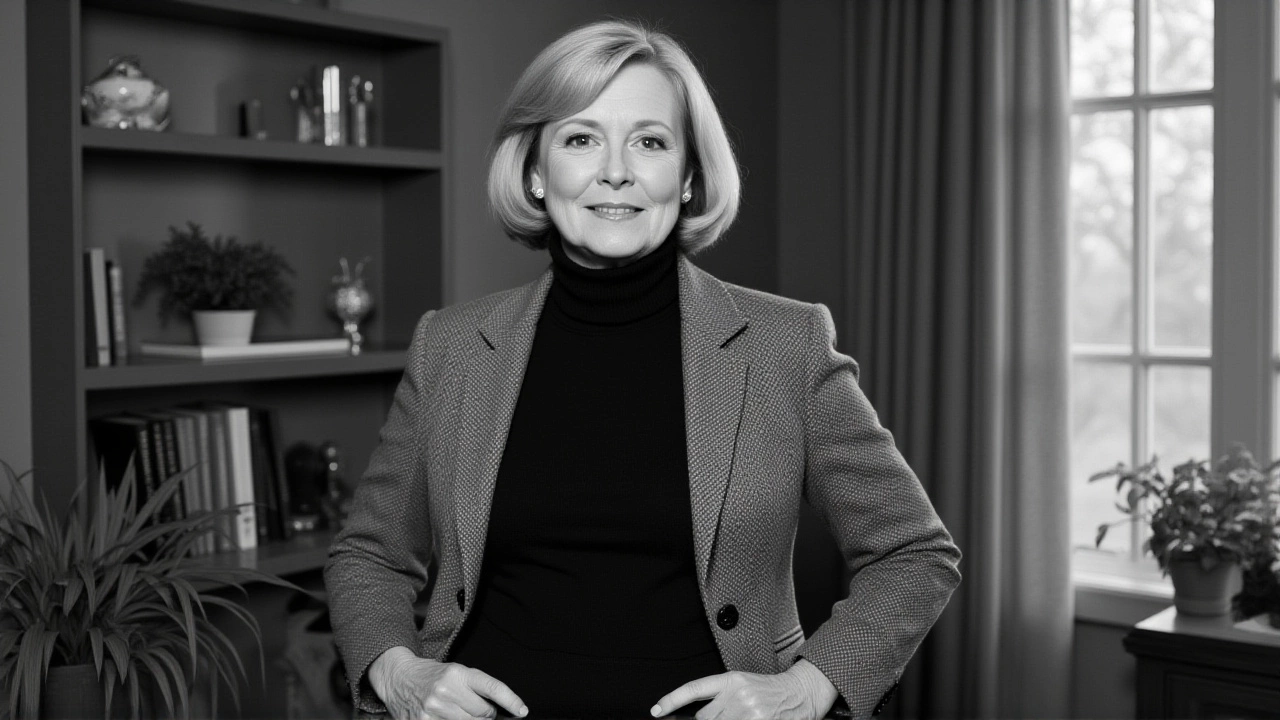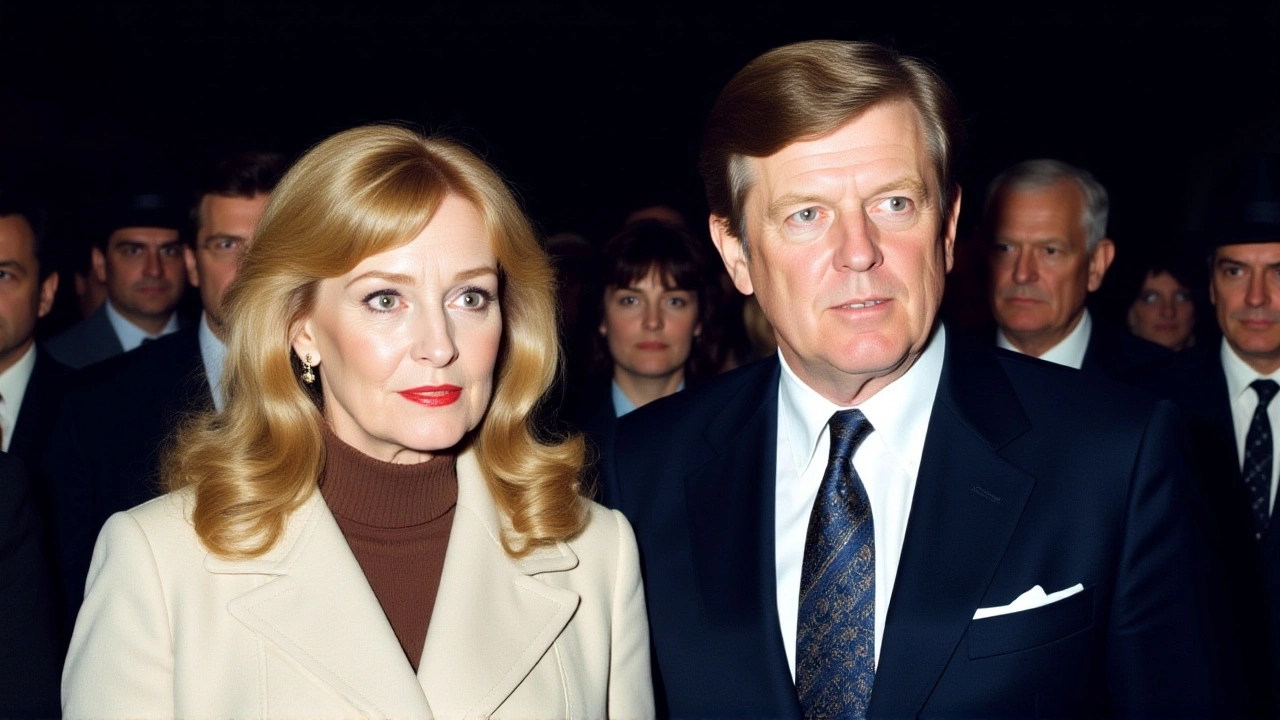When Virginia Joan Kennedy (Bennett), the first wife of late Ted Kennedy, slipped away in her sleep on October 8, 2025, the nation felt a quiet ripple through a family that has been at the heart of American politics for generations.
The 89‑year‑old passed at her Boston home, according to a statement released by her son Patrick Kennedy. He described his mother as a "loving mother, talented musician, and powerful example to millions of people with mental health conditions." The loss touches not only the Kennedy clan but also the arts community that Joan cultivated in the Bay State.
From Model to Political Partner
Born on September 2, 1936, Joan grew up outside of Boston before marrying Ted on June 17, 1958. Their union produced three children: Kara Kennedy, who died in 2011, Edward "Ted" Kennedy Jr., an attorney, and former U.S. Representative Patrick Kennedy. During the 1960s, when Ted suffered a severe back injury in a May 1964 plane crash, Joan stepped onto campaign stages, delivering speeches and helping keep his Senate ambitions alive.
She was also present during the darkest chapters of the Kennedy saga. The assassination of President John F. Kennedy on November 22, 1963, and the murder of Senator Robert F. Kennedy on June 5, 1968, unfolded while she was navigating motherhood.
The Chappaquiddick Shadow
July 18‑19, 1969, remains a pivotal moment. The Chappaquiddick incidentChappaquiddick Island, Massachusetts saw Ted’s car plunge off a bridge, killing passenger Mary Jo Kopechne. At the time, Joan was pregnant and already had endured two miscarriages. She attended Kopechne’s funeral and stood beside Ted when he pled guilty to leaving the scene, an ordeal that precipitated a third miscarriage.
In the aftermath, Joan’s battle with alcoholism intensified. Arrests for drunk driving and a harrowing May 22, 2005 incident—when a passerby found her unconscious on a rainy Boston sidewalk—led to a concussion, a broken shoulder, and a court‑ordered guardianship arranged by her son Edward.
Turning Pain into Advocacy
Through the 1970s and 1980s, Joan opened a new chapter. Interviews with People and McCall's magazines revealed a woman using alcohol to numb the ache of public scrutiny. Yet those same conversations chronicled her gradual embrace of the Alcoholics Anonymous twelve‑step program, making her one of the earliest public figures to discuss addiction openly.
After divorcing Ted in 1982, she reinvented herself as a music scholar and performer. Her passion for classical piano and folk song found a home in Boston’s vibrant arts scene, where she taught, performed, and raised funds for mental‑health charities. That work inspired her son Patrick, whose post‑Congressional career has centered on mental‑health policy, earning him a reputation as "one of the nation's premier crusaders for mental health services."
Family Reactions and Legacy
Family members gathered at a modest service in Boston’s historic Old South Church. In his remarks, Patrick highlighted his mother’s "quiet strength" and the way she "paved a path for honest conversations about mental health at a time when stigma was the norm." Edward Jr., the family attorney, noted that Joan’s grandchildren now carry forward her love of music, often performing at community events she loved.
Beyond the Kennedys, former colleagues in the arts remember her as a "generous mentor" who would open her home to emerging musicians. One Boston saxophonist recalled, "She taught me that playing the blues isn’t just about notes—it's about bearing your soul, just like she bore hers in the public eye."

Broader Impact on Mental‑Health Discourse
Joan’s candidness about addiction pre‑dated the modern mental‑health movement by decades. By sharing her story in mainstream magazines, she helped shift public perception, encouraging other public figures to speak out. Researchers point to a measurable uptick in AA enrollment rates among women in the 1980s, correlating with her high‑profile interviews.
Her advocacy also intersected with policy. In 1999, the Kennedy family’s push for mental‑health reform in Congress referenced Joan’s experiences as a personal testament to the need for better treatment access. The resulting legislation expanded Medicaid coverage for substance‑use disorders, a change that still benefits millions today.
What Comes Next?
While funeral arrangements remain private, the Kennedy family plans a memorial concert at the Boston Symphony Hall later this year, honoring Joan’s lifelong devotion to music. Organizers say the program will feature pieces she loved—from Beethoven sonatas to contemporary folk arrangements.
For the mental‑health community, her death reignites calls for a national awareness month dedicated to families affected by addiction, a proposal championed by Patrick Kennedy in recent hearings.
Key Facts
- Virginia Joan Kennedy (née Bennett) died on October 8, 2025, at age 89.
- She was the first wife of Senator Ted Kennedy (1962‑2009).
- Mother of Edward Kennedy Jr. and former Congressman Patrick Kennedy.
- Advocate for mental‑health and addiction awareness since the 1970s.
- Boston home served as her final residence and artistic hub.
Frequently Asked Questions
How does Joan Kennedy’s death affect the Kennedy family’s public image?
Her passing brings renewed attention to the family’s longstanding involvement in public service and social issues. While the Kennedys have endured many tragedies, Joan’s legacy as a mental‑health advocate adds a compassionate dimension that can soften public perception and reinforce their commitment to health‑care reform.
What were Joan Kennedy’s major contributions to mental‑health advocacy?
She broke silence in the 1970s by speaking publicly about alcoholism, appearing in national magazines and supporting AA programs. Her testimony inspired congressional hearings in the 1990s, contributing to expanded Medicaid coverage for substance‑use disorders, and she continued fundraising for Boston‑based mental‑health charities until her death.
Who survives Joan Kennedy?
She is survived by her two sons—Edward Kennedy Jr., a Connecticut attorney, and Patrick Kennedy, former U.S. Representative—as well as nine grandchildren and roughly 30 nieces and nephews. Her daughter Kara predeceased her in 2011.
What is the significance of the upcoming memorial concert?
Scheduled for later this year at Boston Symphony Hall, the concert will feature music that Joan cherished, symbolizing her lifelong love of the arts. It serves both as a tribute and as a fundraiser for local mental‑health charities, continuing her mission of blending culture with advocacy.
How did the Chappaquiddick incident affect Joan’s personal life?
The tragedy amplified her existing struggles; she suffered a third miscarriage after the incident and her battle with alcoholism intensified. The public scrutiny surrounding the case placed immense pressure on her marriage, contributing to the eventual divorce in 1982.
